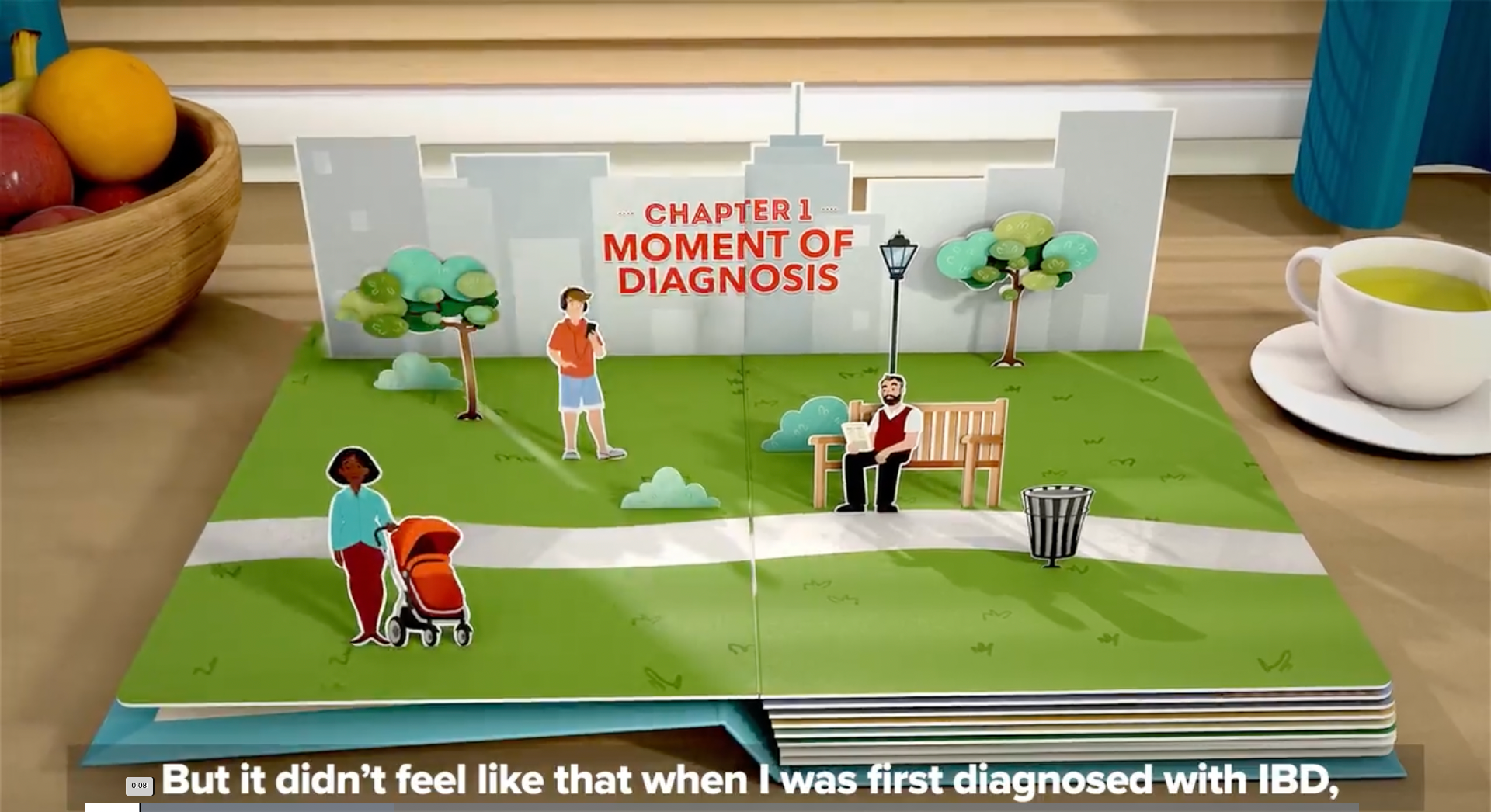Inflammatory Bowel Disease

Caring for someone with IBD
Caring for someone with Inflammatory Bowel Disease (IBD) can be complex and demanding – both physically and emotionally. A carer is anyone who provides help for someone else who is unable to manage without this support. This may be a friend, close relative, or even a neighbour. Most often it is a partner, spouse, parent or guardian.
You may find it difficult to accept that your loved one may no longer be the same person they used to be, or be able to enjoy the same things you used to do together – they may be more irritable or very tired. You may feel that the relationship with your loved one is now purely a carer-patient relationship, based mainly on you looking after them, rather than a balanced one like it was before. All of this is a lot to deal with, especially if this is the first time you have the responsibility of looking after someone. Carers are not trained to help people living with IBD, which makes them different from professionals like nurses or care workers.
Recognising your role and responsibilities as a carer is important. It is the first step you need to take to make sure you get the help you might need now or later on. Remember, part of being a carer means taking care of yourself! And try to stay positive – with a bit of planning, staying on treatment and maintaining a healthy lifestyle, many people with IBD will see their symptoms improve, or perhaps even disappear completely.
Impact of IBD on your loved one’s mental health
A person with IBD may experience not only the physical effects of this condition but also the emotional/psychological effects. Adolescents and young adults are particularly susceptible to IBD related mental effects. Living with a life-long and often painful condition like UC or CD can trigger fear and worry, and increase your loved one’s levels of stress about all different types of practical issues. Overthinking their situation for a long period of time may at times affect your loved one’s mood and make them feel anxious or even depressed. Depression is often not just feelings of sadness; it is a complex condition with many symptoms. These can include:
- Feeling really down for more than a few weeks
- Losing interest in things they used to like
- Feeling empty and isolated, ‘not good enough’ or like the world would be better without them
You can help alleviate your loved one by letting them know that you are there to listen to them whenever they may need you. Honest, open communication about their condition and reassuring them on any insecurities they have may also be helpful. You may also want to suggest your loved one speaks to their doctor about how they feel, as they have experience in these matters and can help them find a fitting solution. Your loved one’s doctor can then talk you through what they think will work best for them.
.png?width=750&height=208&format=png&quality=50)
Practical tips for supporting your loved one
The symptoms of IBD may vary from person to person and over time. It is important that you understand your loved one might need more support at some points rather than others.
Here are a few ways in which you can help:
- Ensure they are taking their medication: The most valuable support you can offer as a carer is reminding your loved one to take their medication, as per their doctor’s instructions. Read the patient information leaflets of the medication your loved one is taking. This way, you are aware of possible side effects and more informed in general.
- Accompanying them to medical appointments: Depending on the reason for your loved one’s medical appointments (some might not allow them to travel on their own), having you there with them may make them feel more relaxed and less stressed.
- Having a sense of humour about the situation: Sometimes, making something seem funny or less serious than it is can make your loved one feel more at ease and less embarrassed.
- Being aware of which triggers may cause a flare-up: Although your loved one’s symptoms may be under control, it will help to be aware of potential triggers to avoid, such as certain foods that can worsen the symptoms. You can also encourage your loved one to keep a diary of what they eat and drink and how they feel, in order to identify those foods or stress situations that are likely to trigger a flare-up.
- When taking your loved one out, do a little research beforehand: To avoid any embarrassing moments and reassure your loved one when leaving the house, check out the availability and easy access to bathrooms near the location you are going to or en route if travelling long distances. If you are going to a restaurant, for instance, checking out the menu before you go for food that your loved one can safely eat, may also be helpful. If you feel that your loved one is not up to going out, then plan a dinner or night in – if that’s what they want.
- Spotting non-gastrointestinal (GI) symptoms: As mentioned in the ‘About IBD’ section, apart from GI symptoms, some people may also develop anaemia (not enough red blood cells in your blood, which can make you feel unwell) or have problems with their joints, skin and eyes. As a carer, you can help your loved one by keeping an eye on these symptoms and informing their doctor about them.
- Keep track of your loved one’s screening check-ups: As a carer, you can help ensure or remind your loved one of the need to follow their doctor’s instructions regarding their programmed screening appointments and check-up.
- Support them with their subcutaneous injections if they seem fearful or unsure – knowing you are there can be reassuring and will help put them at ease. You can either support them by helping them follow the product’s self-injection instructions or by getting trained by a doctor on how to do the injections.
- Keep talking – your loved one may find it difficult to explain the symptoms of IBD to you, their friends or members of the family – see our Lexicon for how to start difficult conversations with them or help explain it to others on their behalf.
- Help your child by being transparent and provide them with the tools to understand and prepare for their IBD. Helping to plan for bathroom accidents and their treatment can help them learn to control their condition as they grow older.
You may also find it helpful to read through other sections in this website so you are aware of all information they are being given.
Don’ts for supporting your loved one
- Be judgemental: If they are reluctant to do things, e.g. housework, it is probably not due to laziness but rather to the fact that they cannot physically manage to do it.
- Show them disappointment when plans need to be changed: Because of the unpredictable nature of IBD, making plans may be somewhat challenging. Your loved one may feel bad about letting you down, so it is important that you reassure them that it is not their fault and that it is no trouble to make new arrangements.
- Stress them about finances: Due to their IBD, it is possible that they might not be able to work full time. Prescription costs and transportation to the hospital may be an issue. If your loved one has financial difficulties due to their condition and may not be able to face the costs of a night out, try and support them by finding an inexpensive way to take them out or organise a night in. If you are worried about finances, there are organisations that can help – see here [hyperlink to relevant page] for further information.
- Make them think that their condition is due to a poor diet: There is no conclusive evidence that any food can cause IBD and the relationship between IBD and food is different for everyone
- Offer them non-steroidal anti-inflammatory drugs (NSAIDs): Pain killers such as ibuprofen, diclofenac or aspirin can make IBD symptoms worse.6
Tips for looking after yourself
- Be realistic about how much you can help: Although your help is very valuable, it is important that you set certain boundaries. There is only so much you can do!
- Be honest: Although you may think that being honest about your feelings may hurt your loved one, in the long term, it will make things easier for both of you.
- Don’t do more than you can do: If things are getting too much, make sure that you take a break if you need to and take time for yourself. You need to be well in order for your loved one to be well too!
- Get help or support from others if you need it: Ask other people from your family or friends if they can relieve some of the pressure by helping out with some of the tasks so that it does not become too much for you to handle. If close family and friends don’t understand your situation, try connecting with other people in your same situation through online forums etc. If you feel too overwhelmed, you may want to consider counselling.

My IBD Journey offers guidance on how to plan and manage the range of symptoms you may encounter as an individual living with Inflammatory Bowel Disease (IBD), allowing you to live your life to the fullest.
